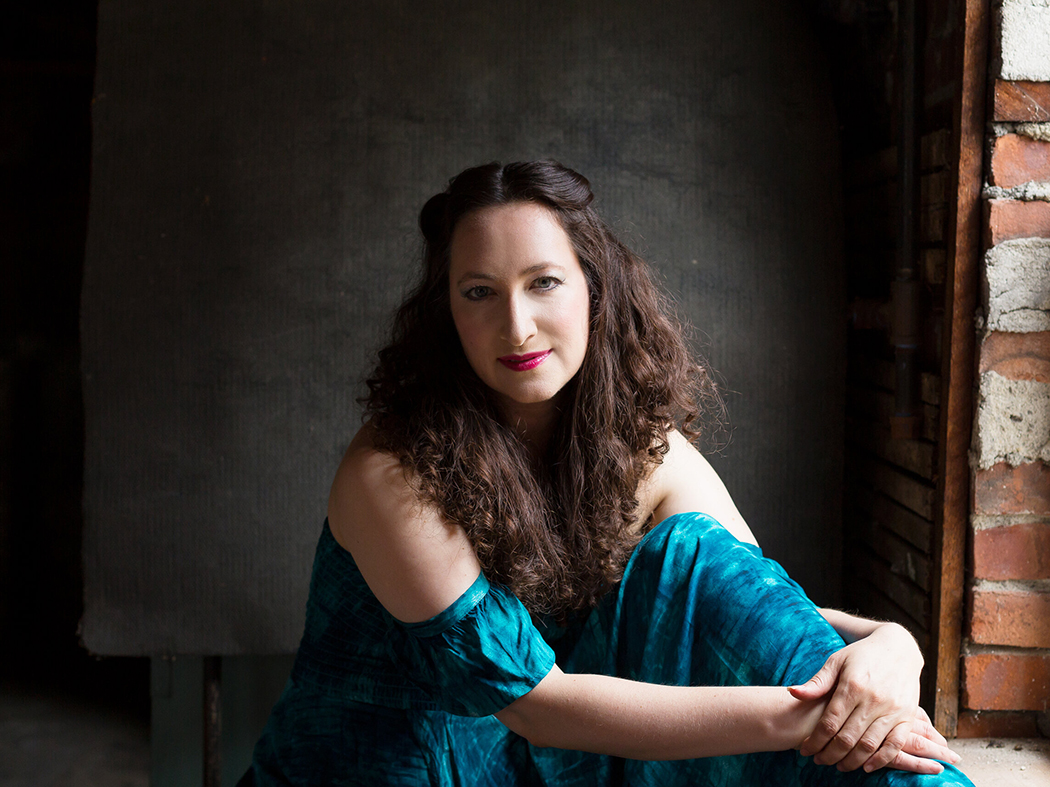On the enclosed patio of the Twisted Branch Tea Bazaar, Reagan Riley reclines into a stack of jewel-toned pillows scattered on the bench behind her as grey-white wisps of fruit-flavored tobacco vapor curl through the afternoon air, dissipating into a thin haze that’s more sunshine than hookah smoke. The room’s hardworking window A/C unit hums while Riley takes a sip of a matcha cooler—a deep, emerald green iced tea with a slight vegetal flavor, recommended by the tea house owner for its ability to take the edge off of a July afternoon in Charlottesville. Riley deems it “so nice.”
The whole scene is chill as fuck and therefore the perfect setting for Riley to discuss her electronic/neo-soul music.
Riley was raised in Charlottesville by musician parents—mom’s a singer and flutist, dad’s an a cappella singer and trumpet player—who encouraged their only child to pursue any and every creative interest: painting, drawing, poetry, singing. She’d always loved singing along to R&B and rap tracks and, in 2016, at age 18, stepped into the recording booth herself. Since then, she’s sung the hook on a slew of local rap tracks and appeared onstage with her collaborators. She’s released a good amount of her own original material, too, including the Summer Complex EP (2016), the Grown Since full-length album (2018), and a number of singles. After three years of writing and recording, Riley will perform her first-ever solo set on Wednesday night at The Garage (and her second on Sunday at IX Art Park). So, what’s taken her so long?
The short answer, says Riley, is fear. But the long answer—the real answer—is that Riley, just 21, has been taking her time finding her sound and herself.
“I’m an introvert,” says Riley. “I’ve always been kind of shy,” a singer who stepped into the booth not necessarily with the intention of sharing her work with others, but to grow confident in her voice and her lyrics.
Music “makes it very easy” for Riley to express whatever she’s thinking or feeling. “I’m always writing about my experiences, so in that sense, it’s always just my truth, however that comes out,” she says.
What comes out, says Riley, is a style that’s “definitely R&B, neo-soul-like. Chill vocals, kind of sensual and sexy. I don’t have a super big voice; my thing is more of a vibe. It’s a mood.” She’s been compared to Syd Tha Kyd (from The Internet) and SZA, and she says she feels a bit of vocal and vibe kinship with local indie folk-pop artist Kate Bollinger.
Riley sings on several local projects including the hook on Sondai’s “Silver Linings,” and on “Shadow,” off CLARKBAR$’ Tasty project. She’s collaborated with Keese a number of times.
“Reagan is dope,” says Keese. “Her style is unique. All you have to do is send her the track, she’ll write and come up with her own ideas. She turns a good song into a great song.”
Riley likes to mix up her process. Sometimes she’ll get a line in her head, write it down, and the next day, incorporate it into a song. Sometimes, she’s in the mood to write poetry instead, but when she looks back on it weeks or months later, it sounds like pretty good lyrics.
“I try not to do it the same way every time,” says Riley. “I think that’s dangerous…being creative is just being in the now, and if you’re caught up on doing something a certain way, you might miss up on an opportunity for something beautiful and organic to happen.”
Sometimes she hears the perfect beat—either given to her by a producer, or sourced from YouTube—and will have a song on the page in 10 minutes, without a change. That’s how it went with “Weekend,” her newest single, recorded after Riley hadn’t sung into a mic for about a year.
“It’s good to be back,” Riley declares at the start of “Weekend,” which is about the aftermath of a relationship that she was ready to end. It’s a song about self-rediscovery, Riley’s realization that she can’t lift people up if someone’s holding her down. It’s the kind of song that you might put on the stereo of a convertible as you drive a little too fast on a beachside highway, experiencing the freedom of movement that’s in your ears.
“The End,” another of Riley’s recent Spotify releases, is about her ability to see through bullshit. “This foamy sticky humidity, I look right past what eyes can see,” she sings at the start of this song. It’s an acknowledgment of how far she’s come already, and how past relationships have shaped her future—as a person and as an artist hoping to connect with her audience.
And right now, that means stepping into the spotlight as a solo artist on stage (with a little help from her rapper friends, at times), fear be damned.
Music “feeds me,” she says, settling deeper into the pillows and taking a sip of the matcha cooler. “It feeds my soul. It makes me happy, in the simplest sense. It’s good for me. And I’m always trying to do things that are good for me.”
Reagan Riley will perform her first solo sets this week: she’s at The Garage Wednesday, July 24, and at IX Art Park Sunday, July 28.
UPDATE: Wednesday, July 24, 11:15am. The show at The Garage has been cancelled.








